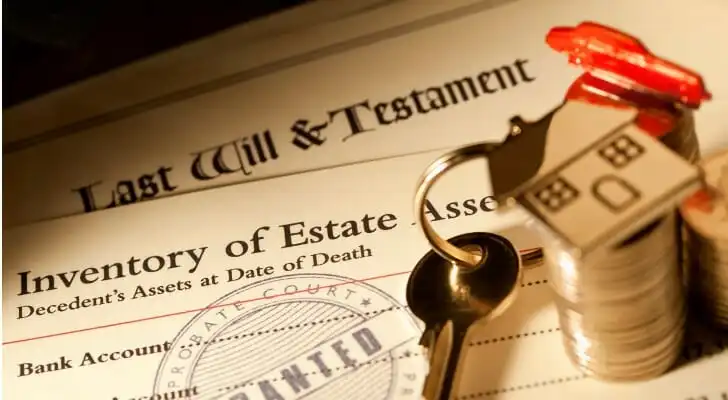Probate is the court-supervised process of validating a person’s will after they die. The process includes locating the deceased’s remaining assets, settling outstanding debts, and ensuring the estate’s property is allocated to the designated heirs. State probate laws vary, but the process is very similar across the country, with lawyers doing most of the heavy lifting. It’s helpful, though, to know what’s involved, whether you’re writing your will or you’re an executor or beneficiary. For more hands-on guidance with estate planning, consult a financial advisor.
What Is Probate and How Does It Work?
In simple terms, probate is the method by which a deceased person’s will is processed. TThis typically involves lawyers and a court proceeding in which the stipulations in the will are reviewed, and the appropriate inheritances are distributed. The probate process can take some time, depending on the size of the estate.
Most wills name an executor, who takes charge of overseeing the probate process. This person typically has 30 days from the date of the will owner’s death to file the document with the local probate court.
If the decedent died without a will or didn’t clearly identify an executor in one, the probate court will appoint an administrator to oversee the probate process. This role often falls on the next of kin. However, a named executor or appointed administrator can always decline the role. In these cases, the court turns to someone else. This person overseeing probate must prove to the court that the will is valid.
When Is Probate Necessary?
Probate is not always required to transfer property. Several states’ laws indicate that property valued below a certain amount can be passed on to heirs without probate or through a simplified version of it. But if an estate exceeds that value, then probate must be initiated.
If a person dies without a valid will in place, they are considered to be “intestate.” To handle such situations, each state has intestate succession laws that dictate inheritance distribution based on family relationships. For example, intestate succession usually consists of spouses, parents, siblings, grandparents, cousins and more.
Certain accounts such as 401(k) plans, individual retirement accounts (IRAs) and pensions with listed beneficiaries don’t need to go through the probate process either. The same applies to insurance policies. These funds transfer directly to the named beneficiary following the death of the account or policyholder.
How to File and Validate a Will
Most state laws require an executor to file a will with the local probate court as soon after the death of the decedent as possible. This person may also need to file the death certificate as well as a petition to open probate at the same time.
Next, a probate court judge determines whether the will is legally valid. This usually involves a hearing in which all of the beneficiaries listed in the will have a right to look at the document and accept or object to their role in it. The court decides how to move forward in cases where wills are contested.
But how does the probate court figure out if the will is valid? In many cases, self-proving affidavits help validate and finalize wills. The will’s grantor, along with witnesses, will sign off on these. In most cases, these documents hold enough weight for the court to kick off the probate process.
Once that happens, the executor receives and signs letters of authority or letters of administration. This means the executor formally agrees to oversee the probate process and manage the estate.
In some states, the executor must also post bond. This is an insurance policy that protects beneficiaries in the event the executor intentionally or unintentionally makes a costly error during the probate process.
Identifying Assets for Probate
Once the probate process begins, the executor must identify all of the decedent’s assets and their value. This usually means diving into banking and investment account statements, tax documents and more.
Some states require executors to provide the court with a document that details the decedent’s assets, their value and notation on how that value was reached. This determines the “date of death values.”
The executor may also need to take physical possession of property such as fine art and vehicles. Taking physical possession of real estate isn’t necessary. But the executor would have to make sure property taxes, insurance and mortgage payments are properly covered throughout the probate process. The decedent’s estate can pay these and all other debts.
Contacting Creditors and Paying Off Debt
An executor must also identify and notify the decedent’s creditors. These creditors typically have a limited time in which they can make claims against the decedent’s estate. These time frames vary by state.
However, an executor can challenge these claims. The creditor may then petition the court to make a decision in the matter.
In either case, the estate must pay off official debts. These may include medical bills and other expenses the decedent couldn’t cover before death. Since these debts are settled from the decedent’s estate, significant debt can reduce the assets available to heirs.
Filing the Decedent’s Final Taxes
Unfortunately, death doesn’t clean your slate with Uncle Sam. Because of this, an executor must file and pay off any of the decedent’s final taxes with estate funds.
The federal estate tax can climb to as much as 40%, and some states enforce their own as well. At the federal level, though, the 2025 estate tax only applies to estates that are worth $13.99 million or more.
Estate taxes are typically due within a year following the owner’s death. However, one can reduce the size of his or her estate during life in order to transfer property tax-free.
Distributing Property From an Estate

An executor usually needs to provide the probate court with documentation detailing every transaction he or she engaged in during the probate process thus far. These filings would also detail the exact value of the remaining estate. However, some states allow the executor to waive this requirement if all beneficiaries believe it’s not necessary.
After the court confirms all debts and taxes are settled, it can proceed with distributing the remaining estate according to the will.
If a person died without a will, the court typically divides assets and property among immediate family members. Someone who dies without a will has passed away “intestate.” The surviving spouse, if any, typically takes priority.
How to Avoid Probate
The probate process can chip away at the decedent’s estate before it is distributed to the heirs. However, there are several estate planning techniques one can engage in during life in order to shield property from the probate process.
Use Payable-on-Death and Transfer-on-Death Accounts
Payable-on-death (POD) accounts and transfer-on-death (TOD) accounts allow individuals to pass assets directly to beneficiaries without going through probate. These designations offer a simple, cost-effective way to streamline estate planning and provide immediate access to assets for beneficiaries.
A POD account is typically used for bank accounts, such as savings, checking and certificates of deposit. The account holder designates a beneficiary, and upon their death, the funds transfer directly to the named individual.
A TOD account, on the other hand, is commonly used for investment assets like stocks, bonds, and brokerage accounts. Some states also allow TOD designations on real estate deeds and vehicle registrations. These accounts function similarly by allowing the asset owner to name a beneficiary who automatically receives the asset upon their passing.
Revocable Living Trusts
Another common strategy is transferring property to a revocable living trust. These trusts can hold various assets, including homes, vehicles and valuable possessions. When property is transferred into the trust, it is removed from the estate and does not go through probate.
A trust document outlines how assets will be distributed among heirs. The trust also requires a trustee to manage and distribute property. Typically, the grantor serves as the trustee during their lifetime and appoints a successor trustee to take over upon their death, at which point the trust becomes irrevocable.
Gifting Assets During Your Lifetime
Gifting property during one’s lifetime is another way to reduce probate assets. In 2025, individuals can give up to $19,000 per recipient without triggering gift tax concerns. For example, a person with three children could gift each $19,000 in cash or property without tax implications.
If a gift exceeds $19,000 to a single recipient, the overage is deducted from the lifetime estate and gift tax exemption, which is $13.99 million in 2025. For example, gifting $30,000 to a child for a home down payment would reduce the lifetime exemption by $11,000. Generally, only gifts exceeding the exemption require filing Form 709, and estate or gift taxes are only due when the lifetime exemption is fully exhausted.
Bottom Line

Probate may sound intimidating, but it shouldn’t be a daunting process. A detailed will that designates an executor can ensure the proper transfer of your property to the right heirs after you die. The probate process isn’t always necessary, however. So it’s important to seek help from a lawyer to see how state law affects probate in your area. Seeking a financial advisor for guidance around estate planning can also protect your property from probate and taxation.
Tips on Estate Planning
- The probate process can hold up the distribution of your assets for as long as a year. With good estate planning, though, you can help your heirs avoid this delay. A financial advisor can help you plan your estate, as well as manage your wealth. SmartAsset’s free tool matches you with vetted financial advisors in your area, and you can have a free introductory call with your advisor matches to decide which one you feel is right for you. If you’re ready to find an advisor who can help you achieve your financial goals, get started now.
- A revocable living trust can help secure your property from probate, but it’s not the only kind of trust around. Look into how different trusts work to see which kind is right for you.
Photo credit: ©iStock.com/stocknshares, ©iStock.com/hikesterson, ©iStock.com/Drazen Zigic
